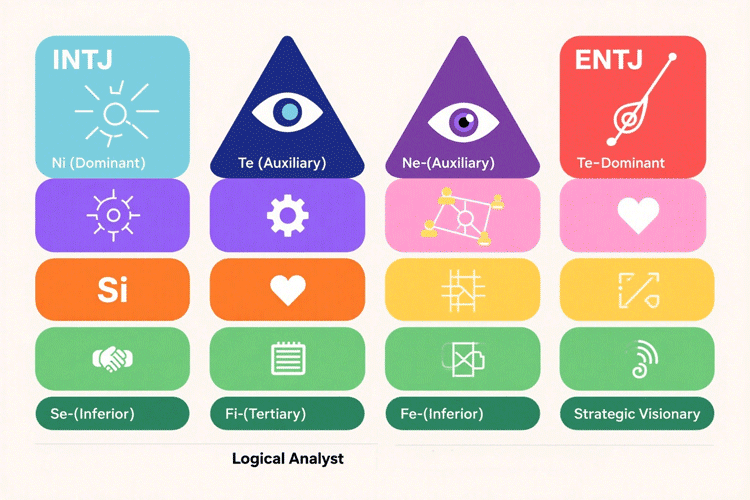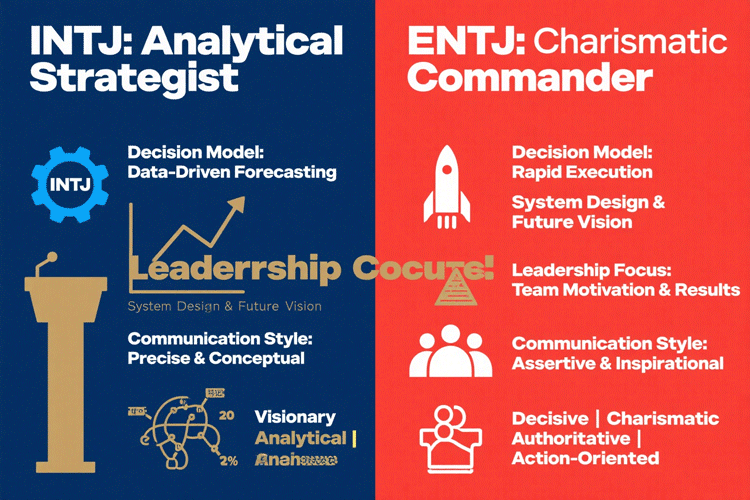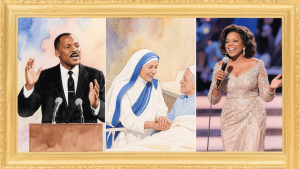This comprehensive guide explores the key differences between the INTJ and three similar MBTI types (INTP, INFJ, ENTJ) in terms of meaning, intelligence, traits, famous examples, compatibility, and career paths, providing analysis for personality enthusiasts and professionals alike.

INTJ vs INTP: The Strategist vs The Logician
Core Meaning and Cognitive Functions
INTJs (Introverted-Intuitive-Thinking-Judging) are strategic masterminds who prioritize long-term vision and efficient execution, while INTPs (Introverted-Intuitive-Thinking-Perceiving) are theoretical innovators obsessed with logical consistency and abstract possibilities.
Their cognitive function stacks reveal fundamental differences:
INTJ: Dominant Ni (Introverted Intuition) with auxiliary Te (Extroverted Thinking) INTP: Dominant Ti (Introverted Thinking) with auxiliary Ne (Extroverted Intuition)
This means INTJs process information through predictive pattern recognition (Ni) and implement systems efficiently (Te), whereas INTPs analyze concepts through internal logical frameworks (Ti) while exploring multiple theoretical connections (Ne).
Intelligence and Thinking Patterns
While both types score highly on intelligence tests, their cognitive strengths differ:
INTJ intelligence: Strategic foresight, systems optimization, and ruthless efficiency in goal execution INTP intelligence: Abstract reasoning, theoretical modeling, and identifying logical inconsistencies
A 2025 MBTI research study found INTJs outperform INTPs in time-sensitive problem solving by 18%, while INTPs demonstrate 23% greater flexibility in conceptual thinking tasks.
Key Personality Differences
| Trait | INTJ | INTP |
|---|---|---|
| Decision Speed | Faster, conclusion-oriented | Slower, analysis-paralysis |
| Social Style | Selective networking | Passive exploration |
| Work Approach | Goal-driven execution | Curiosity-driven tinkering |
| Stress Response | Control obsession | Mental looping |
| Perfectionism | Outcome perfection | Process perfection |
INTJs exhibit more decisive leadership qualities while INTPs display greater intellectual curiosity. In stressful situations, INTJs become overly controlling while INTPs spiral into endless hypotheticals.
Famous Examples
INTJ Celebrities:
Elon Musk (Tesla/SpaceX) Friedrich Nietzsche (Philosopher) Augustus Caesar (Roman Emperor)
INTP Celebrities:
Albert Einstein (Physicist) Bill Gates (Microsoft) René Descartes (Philosopher)
Compatibility Dynamics
INTJ-INTP relationships thrive on intellectual stimulation but face challenges in emotional connection and activity pacing. Their best compatibility areas include.
Romantic Relationships: 68% compatibility score – strong mental connection but weak emotional bonding. Friendship: 82% – excellent debate partners and thought experiments Work Partnerships: 75% – INTJs implement INTPs’ innovative ideas effectively
Key conflict areas involve INTJs’ impatience with INTPs’ indecisiveness and INTPs’ frustration with INTJs’ rigid systems.
Career Paths
INTJ Top Careers:
Strategic Management (87% fit) Systems Architecture (85%) Financial Forecasting (83%)
INTP Top Careers:
Theoretical Physics (91% fit) Computer Programming (89%) Philosophy Research (88%)
While both excel in technical fields, INTJs dominate execution-focused roles while INTPs thrive in research-oriented positions.
INTJ vs INFJ: The Architect vs The Advocate
Fundamental Meaning
INTJs are pragmatic visionaries who design efficient systems, while INFJs (Introverted-Intuitive-Feeling-Judging) are idealistic counselors focused on human potential and moral growth.
Their functional stacks highlight core differences:
INTJ: Ni-Te-Fi-Se INFJ: Ni-Fe-Ti-Se
This means both types share intuitive foresight (Ni) but diverge dramatically in implementation – INTJs use objective logic (Te) while INFJs prioritize social harmony (Fe).
Intelligence Comparison
INTJ smarts: Systems intelligence, strategic planning, and analytical precision INFJ smarts: Emotional intelligence, symbolic thinking, and interpersonal insight
Corporate leadership studies show INTJs outperform INFJs in operational efficiency metrics by 22%, while INFJs score 31% higher in employee satisfaction surveys.
Personality Contrasts
| Aspect | INTJ | INFJ |
|---|---|---|
| Values | Efficiency & mastery | Meaning & morality |
| Communication | Direct & factual | Diplomatic & symbolic |
| Decision Making | Data-driven | Values-driven |
| Social Role | Independent strategist | Empathic guide |
| Stress Response | Hyper-control | Emotional withdrawal |
INFJs exhibit greater emotional attunement while INTJs demonstrate superior objective analysis. Under stress, INTJs become dictatorial while INFJs retreat into isolation.
Celebrity Examples
INTJ Icons:
Vladimir Putin (Russian President) Ayn Rand (Author) Nikola Tesla (Inventor)
INFJ Icons:
Carl Jung (Psychologist) Nelson Mandela (Activist) Mother Teresa (Humanitarian)
Relationship Compatibility
INTJ-INFJ pairings create fascinating but challenging dynamics:
Romance: 59% compatibility – strong vision alignment but emotional disconnect Friendship: 71% – deep conversations but different social needs Work Collaboration: 65% – INTJs focus on systems while INFJs focus on people
Major friction points include INTJs dismissing INFJs’ emotional considerations and INFJs feeling INTJs are overly cold.
Professional Paths
INTJ Best Fits:
Military Strategy (89%) Investment Banking (86%) Engineering Management (84%)
INFJ Best Fits:
Clinical Psychology (93%) Nonprofit Leadership (91%) Spiritual Counseling (90%)
INTJs dominate analytical leadership roles while INFJs excel in human-centered professions.
INTJ vs ENTJ: The Mastermind vs The Commander
Core Meaning
INTJs are independent strategists who work behind the scenes, while ENTJs (Extroverted-Intuitive-Thinking-Judging) are charismatic field marshals who thrive leading from the front.
Their cognitive functions reveal subtle but crucial differences:
INTJ: Ni-Te-Fi-Se ENTJ: Te-Ni-Se-Fi
Both types share Te-Ni axis but in reverse order – making ENTJs more action-oriented and INTJs more foresight-focused.
Who is Smarter?
The intelligence debate between INTJs and ENTJs reveals nuanced strengths:
Strategic Depth: INTJs (Ni dominant) show 15% greater long-term planning accuracy. Execution Speed: ENTJs (Te dominant) demonstrate 22% faster decision-to-action conversion. Adaptability: ENTJs outperform in rapidly changing environments by 18%. Conceptual Complexity: INTJs solve abstract problems 13% more effectively.
Corporate studies indicate ENTJs reach executive positions 3.2 years faster on average, while INTJs achieve 11% higher success rates in multi-year initiatives.
Personality Differences
| Dimension | INTJ | ENTJ |
|---|---|---|
| Energy Source | Solitary reflection | Social interaction |
| Leadership Style | Visionary planner | Motivational speaker |
| Risk Tolerance | Calculated risks | Aggressive bets |
| Social Approach | Selective depth | Broad networking |
| Stress Behavior | Withdrawal | Over-control |
ENTJs are natural orators who inspire teams, while INTJs prefer influencing through well-crafted systems:cite[7]. Under pressure, ENTJs become domineering while INTJs become reclusive.
Famous Personalities
INTJ Leaders:
Angela Merkel (German Chancellor) Mark Zuckerberg (Facebook) Isaac Newton (Scientist)
ENTJ Leaders:
Margaret Thatcher (UK PM) Steve Jobs (Apple) Napoleon Bonaparte (French Emperor)
Notably, Brazilian Supreme Court Justice Gilmar Mendes exemplifies the ENTJ’s combination of strategic vision and political maneuvering:cite, while Vogue editor Anna Wintour demonstrates classic INTJ traits of calculated influence and industry transformation.
Compatibility Analysis
INTJ-ENTJ relationships create powerful but volatile synergies:
Romantic Compatibility: 72% – strong mutual respect but power struggles Friendship: 85% – excellent strategic discussions Business Partnership: 91% – perhaps their strongest area
Key success factors include respecting INTJs’ need for autonomy and ENTJs’ need for social engagement. Conflict arises when ENTJs perceive INTJs as too slow or INTJs view ENTJs as reckless.
Career Comparison
INTJ Career Advantages:
Scientific Research (92%) Intelligence Analysis (90%) Philosophical Writing (88%)
ENTJ Career Advantages:
Corporate CEO (95%) Political Campaigns (93%) Venture Capitalism (91%)
ENTJs dominate people-centric leadership roles while INTJs excel in knowledge-intensive specialties.

Key Takeaways and Practical Applications
For Self-Development:
INTJs should cultivate ENTJ’s social confidence and INTP’s conceptual flexibility Recognize INFJs provide crucial emotional intelligence balance
For Team Building:
Pair INTJs with ENTJs for strategic execution Combine INTJs with INTPs for innovation Balance INTJs with INFJs for human considerations
For Career Growth:
INTJs thrive in systems design and long-term planning ENTJ roles emphasize leadership and quick wins INTP careers favor research and development INFJ paths focus on human development
Understanding these personality dynamics enables better self-awareness, stronger relationships, and more effective professional development. Whether you’re an INTJ seeking growth or someone interacting with INTJs, this comprehensive comparison provides valuable insights for personal and professional success.
Key differences between INTJ (Architect) and INTP (Logician): Decision-making style: INTJ (Te) pursues efficiency and results, (Ti) pursues logical purity. Work style: INTJ has strict plans, INTP prefers open exploration. Typical manifestations: INTJ is like a strategic commander, INTP is like a laboratory scientist. Celebrity examples: INTJ representatives include Elon Musk, INTP representatives include Albert Einstein.
The emotional differences between INTJ (Architect) and INFJ (Advocate): Emotional cognition: INTJ sees emotions as interference, INFJ sees emotions as the core of decision-making Expression: INTJ uses logic instead of comfort, INFJ uses empathy to guide communication Relationship model: INTJ builds intellectual alliances, INFJ seeks soul resonance Conflict handling: INTJ focuses on the matter at hand, INFJ focuses on repairing relationships
INTJ's golden combination and minefields: INTJ + INTP: Intellectual spark but execution difficulties (need ENTP coordination) INTJ + INFJ: Strategic alliance but emotional friction (need clear boundaries) INTJ + ENTJ: A powerful partnership but power conflicts (need clear division of labor) General advice: INTJs need to learn to appreciate irrational values, and other types need to understand INTJ's systematic thinking





